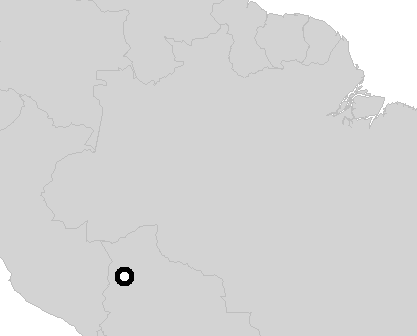
| www.CuriousTaxonomy.net |
|
The Flood in World Myth and Folklore
Amazon Basin |
| © 2021 Mark Isaak |

In ancient times there was a punishment: Water came and covered everything. All the people drowned. Only two children, a brother and sister, survived, being raised up in a great palm. They remained there until the water abated, 20, 30, 40, or 50 days. From the tree they could see nothing else remaining. All the other trees had fallen. God had preserved that one great palm so that the two children would be saved. When they saw that water was subsiding, they knocked down fruit of the palm. "CuU", sounded the fruit. The girl said, "It is still deep, brother. We'll remain here until the water has withdrawn. How will we live? All our parents and relatives are drowned."
When the water had dried off, the pair descended and made a home at the base of the palm. After the flood, the world was one large beach with no hills. The children went away to an old toad woman who was stoking a fire. Only that old toad had survived, and only she had fire. Who knows where she found it. The children went to her and said, "Grandmother, we would like to roast our corn on your fire."
The toad said, "Very well, roast it then, but do not take my fire." Stingily, she let them use her fire. The children roasted their corn and ate hungrily.
Although the old toad woman told them not to take her fire, they took it for themselves. They lit fire to a corncob and took it to where they lived under the great palm. There, they stoked the fire. The old toad saw it and came to them.
"Here comes the grandmother to extinguish our fire, because we have taken hers," said the children.
"The fire that you have brought here is mine, little grandchildren," she said.
"Yes, grandmother, we took it," they said.
"I told you not to take my fire," she said to them. And she stooped and extinguished the fire with her urine. Then she returned to her house.
In the morning, the children went again to the house of the old toad and said, "Good morning, grandmother. We want to roast corn in your fire again."
"Very well. I will have pity on you. But do not take my fire. Yesterday, when I allowed you to roast your corn, I told you not to take my fire, and you took it anyway. This time only am I going to let you roast corn on my fire. I am not going to let you do it again."
Later the boy got engaged to his sister. They fell in love. They had children and thus the people increased again. A son came and then a daughter, and they raised them. The father gave the daughter to the son to be his wife. And from them the people increased, bearing different surnames: Amutari, Lurisi, Ahuada, Cartajena.
That was the last judgment, and God arranged that two young people were saved in the great palm.
Ida de Ottaviano, Textos Tacana (Riberalta, Bolivia: Instituto Linguistico de Verano, 1980), 71-76.

A great flood once came. The water grew higher and higher. One man survived by climbing a king palm, which rose above the flood. He had no food but the fruits of the palm.
In time, the water fell. The man climbed to the ground and began looking for other people. He saw smoke in the distance and went there, where he met a woman who was an Agouti. The Agouti-woman owned a yuca plantation which was not covered by the flood. "Where are you from?" she asked. He answered, "I survived the flood in a king palm." "Come, warm yourself by my fire and have some yuca." She let him live and work on her plantation. In time, he wanted to look for other people, and he told the Agouti-woman this. She consented and gave him some yuca to take with him.
The man went and soon met a woman who was a frog, the owner of a banana and maize plantation. Events proceded as with the Agouti-woman. After cleaning her plantation, he went looking for other people.
He met a woman, and they lived together. They grew crops of yuca from the seedlings given to the man by the Agouti-woman, and banana and maize from what the Frog-woman gave him.
Karin Hissink and Albert Hahn, Die Tacana, Band I: Erzahlungsgut (Stuttgart: W. Kohlhammer Verlag, 1961), 46.

Twenty days before the big flood, a dirty dog went into a house. He went to another house and was again thrown out, and so again at a third house. When he went to yet another house, an old man there washed him and cared for him. Then the dog disappeared. A short time later, the man met a very old man in his field. "I want to tell you," said the very old man; "build a balsa (a raft of balsawood) with a refuge hut. Make one side of the hut for your family, and the other for all kinds of animals on earth. A big flood is about to come." Then he disappeared.
The old man's sons at first did not want to follow this advice, but they finally built the balsa as the very old man had directed. When the finished, thunder, lightning, and rain began. The old man, his family, and the animals took refuge on the balsa. The flood rose for fifteen days and then slowly started to sink. To see where he could settle his family, the old man sent out a vulture, but it did not return. Then he sent an eagle, which located the best place on earth to live.
Karin Hissink and Albert Hahn, Die Tacana, Band I: Erzahlungsgut (Stuttgart: W. Kohlhammer Verlag, 1961), 497; see also 498.
